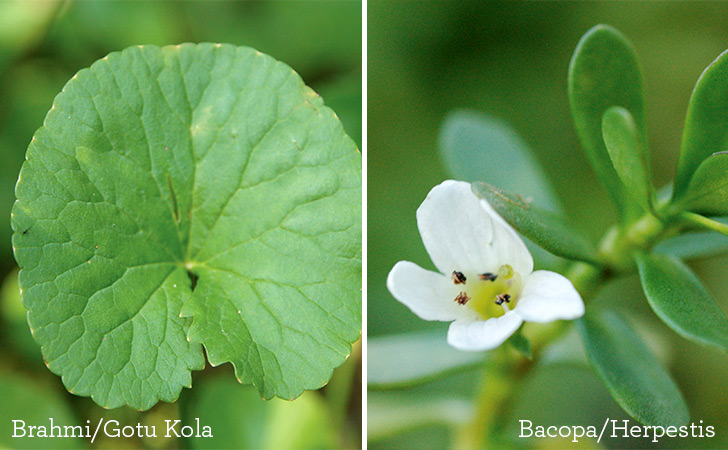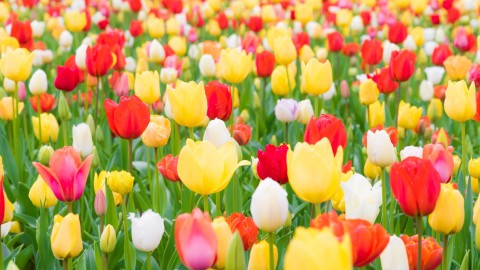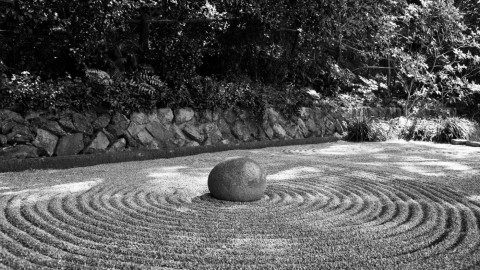“Brahmi” has been used to describe two distinct Ayurvedic herbs – Centella asiatica and Bacopa monnieri – and brahmi is a fitting name for both of them. Brahmi is a Sanskrit word that refers to the feminine essence of universal consciousness as well as the creative potential that emerges from pure awareness. Both of the herbs that bear the name brahmi are thought to promote subtle awareness and sattva (the pure essence of consciousness). They are also both highly revered for their mind-enhancing properties and their support of the nervous system as a whole. This article will focus on highlighting the primary applications of each of these herbs, as well as some useful distinctions between them.
To some extent, the dual use of the name brahmi can be understood by simple geography; in southern India, “brahmi” refers to Bacopa monnieri, and in Northern India, it is Centella asiatica that is commonly known as “brahmi.” In the west, Centella asiatica is also widely known by its Singhalese name, “gotu kola.”
To make matters even more complicated, each of these herbs has two Latin binomial names; Centella asiatica is synonymous with Hydrocotyle asiatica and Bacopa monnieri is synonymous with Herpestes monniera. The fact that these two herbs have very similar actions only adds to the confusion that exists around them. Hopefully, the information that follows will offer some clarity. In the interest of simplicity, we will refer here to Centella asiatica as “gotu kola” and Bacopa monnieri as “bacopa.” Honoring the fact that both of these herbs have legendary effects on the mind and consciousness, we will use “brahmi,” to refer to both them – in reference to the actions and benefits that they share. Banyan Botanicals carries both gotu kola and bacopa in bulk and they are each important ingredients in a number of Banyan products. While it’s true that the names of these two herbs vary between teachers and geographic regions, the founders of Banyan Botanicals were educated in a tradition that reserves the name “brahmi” for gotu kola (Centella asiatica), and therefore offers this herb as “Brahmi/Gotu Kola.” Banyan offers Bacopa monnieri as “Bacopa/Herpestis.”
Benefits of Brahmi (both herbs)
- Open and clarify the mind*
- Strengthen memory and intellect*
- Support focus and concentration*
- Encourage a balanced emotional state*
- Promote daytime energy and nighttime sleep*
- Support healthy blood cells*
- Promote healthy skin and hair*
Both gotu kola and bacopa pacify vata, pitta, and kapha. In excess, either one may increase vata. Both herbs have a strong affinity for the lymph, blood, nervous tissue, and urinary tract, as well as the circulatory, digestive, and nervous systems. In addition, gotu kola works on the muscle, adipose, and bone tissues whereas bacopa resonates with all of the tissues in the body as well as the channels of elimination. And while some describe bacopa as cooling, others insist that it is in fact, heating – though still calming to pitta. Relative to gotu kola, let’s just say that bacopa is less cooling and may therefore be preferred in certain types of vata and kapha imbalances. Gotu kola will generally be the better choice where there are strong indications of pitta imbalance. This is, of course, a subtle distinction because both herbs are considered to be tridoshic (balancing to vata, pitta, and kapha) and for specific conditions one may be preferred over the other. Bacopa is likely more suited for overall strengthening, and energy promotion. Gotu kola is purifying and rejuvenating – especially for pitta. Both are said to support longevity. Gotu kola is an appetizer while bacopa suppresses the appetite; bacopa is therefore often taken with digestives such as ginger or cardamom. In addition to the benefits described below, both herbs known as brahmi are very supportive of the joints – clearing toxins while promoting comfort and freedom of movement.
Brahmi for the Mind
Both forms of brahmi are known to rejuvenate the mind, enhance memory, improve concentration, and to directly influence the quality of consciousness. Both are considered sattvic herbs (promoting subtle awareness). In fact, both are often used to support meditation as they increase the clarity and subtlety of mind. Both bacopa and gotu kola work very directly to improve the quality of sadhaka pitta (which is closely related to the intellect and intelligence) and as tonics for the mind, they are both indicated in a broad range of mental imbalances – both behavioral and developmental. Further, because Ayurveda illuminates an intimate connection between the heart and the mind, it is significant that both forms of brahmi are known as heart tonics. While bacopa is generally preferred for vata aggravations and mental debility due to stress and exhaustion, gotu kola is preferred in mental or emotional aggravations involving both vata and pitta.
Brahmi for the Nervous System
Both bacopa and gotu kola are renowned for their effects on the nervous system. They both enhance and tonify majja dhatu (the nervous tissue) and help to relax tension in the body. They are simultaneously calming and stimulating, improving daytime alertness and focus while reducing stress throughout the system and improving the quality of sleep at night. On a more specific level, bacopa is known to reduce muscular tension and prevent constipation caused by stress, whereas gotu kola relaxes the central nervous system and slows the effects of aging.
Brahmi for the Skin
Both bacopa and gotu kola are very soothing to the skin and scalp. They are both considered very useful in clearing aggravations of the skin, though bacopa would be favored when an underlying nervous imbalance is involved and gotu kola would be more effective with evidence of increased pitta. Both are also used to promote healthy hair growth. Applying either herb to the scalp has the added advantage of a close proximity to the brain and central nervous system, where the herbs are well positioned to inspire many of the above-mentioned benefits. Overall, gotu kola is considered to have a more significant affinity for the skin and it has wondrous effects on bhrajaka pitta (located in the skin). It promotes proper healing of wounds and minimal scarring, while helping to cleanse, soften, and protect the skin.
How to Use Brahmi
External Use of Brahmi
Oil: Brahmi oil (made with either bacopa, gotu kola, or both) can be applied to the exterior of the body to promote healthy skin, proper healing, and freedom of movement in the joints. It may also be massaged into the scalp to support healthy hair growth and to encourage any of the many benefits brahmi offers the brain, the nervous system, and the mind.
Paste: A paste of brahmi (again, made with either bacopa or gotu kola) can be applied to the exterior of the body to promote healthy skin, and comfortable movement of the joints.
Churna: Bacopa and gotu kola powders offer the full experience of tasting the herbs and also provide the most economical option for purchasing either form of brahmi. Either bacopa or gotu kola can be taken as a hot or cold infusion in water. Quite often, these herbs are taken in ghee because it helps to direct them toward the mind and the nervous system. Another popular carrier for brahmi is milk because it enhances the tonifying and cooling properties of the herbs. In some instances, taking brahmi in a different carrier substance may help to direct the herb to a specific tissue or organ, or guide it toward a particular kind of systemic support. An ayurvedic practitioner can advise you on the appropriate anupan (carrier) for your herbs. You can also refer to the Ayurveda’s Carrier Substances guide to better understand which anupan is most appropriate for you. A typical dose of brahmi powder is ¼–½ teaspoon, once or twice daily, or as directed by your healthcare practitioner.
Tags: Ayurveda Bacopa Monnieri Brahmi Centella Asiatica The Dual Use










